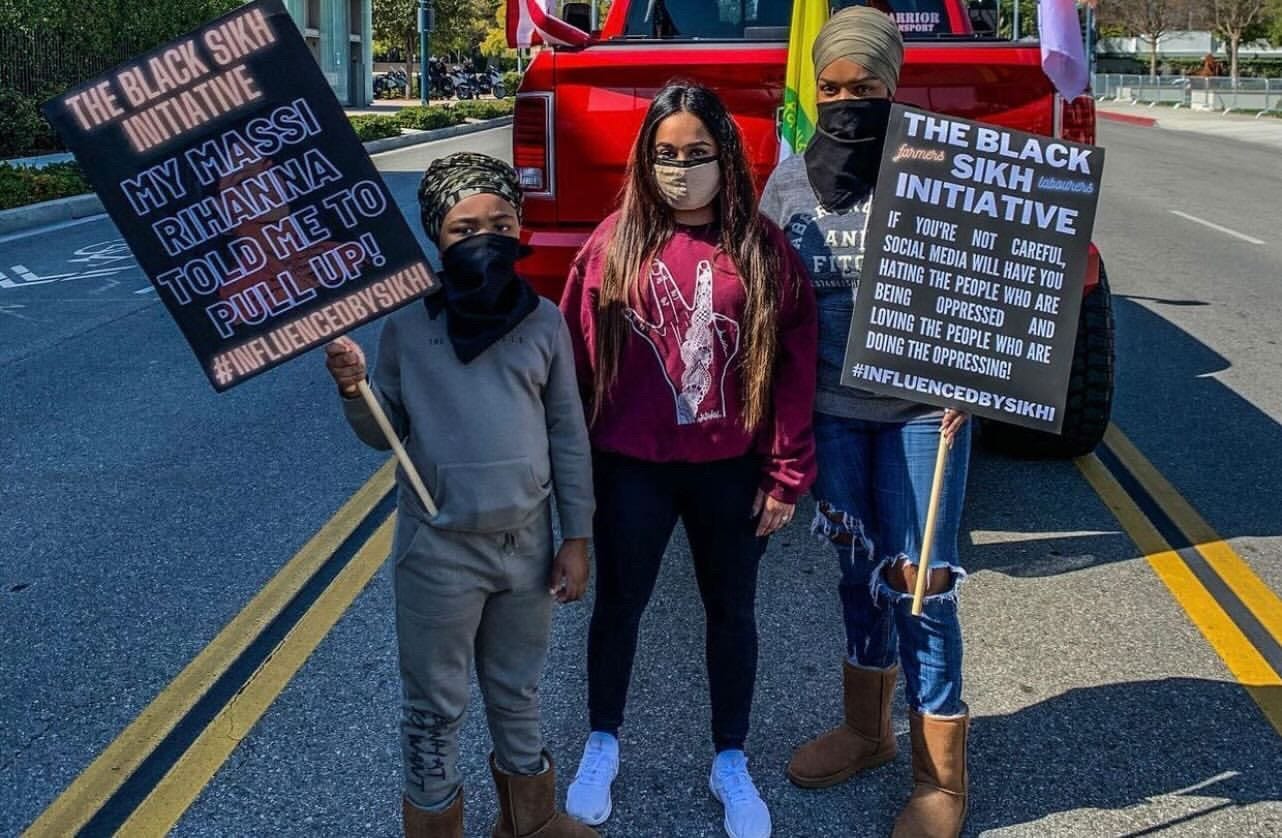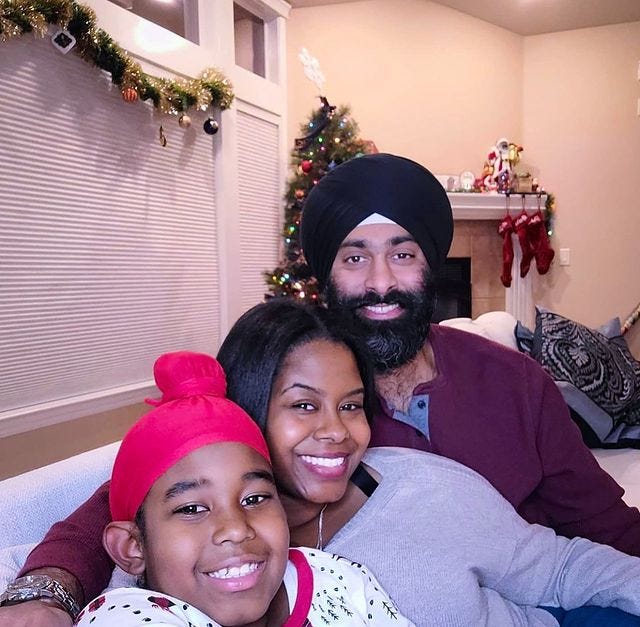Monika Sidhu: The Black Sikh Collective Is Building A More Inclusive Community
“Being a Black Sikh, or being a non-Punjabi Sikh…it feels nice to know there are people out there that you can relate to, that can basically guide you."
Monika Sidhu
January 28, 2022 | 5 min. read | Original Reporting
When Brianna Sukhmani Kaur started the Black Sikh Collective (BSC) in 2020 she was hoping to establish a wider conversation around being both Sikh and Black. Such experiences have not been discussed widely in the diaspora, even as the community grows.
“Being a Black Sikh, or being a non-Punjabi Sikh…it feels nice to know there are people out there that you can relate to, that can basically guide you,” she says in an interview with Baaz.
For her, it was about being able to speak on the experiences of Black Sikhs while also hoping to create a space that was inclusive to not only all the diverse voices within the Sikh world but for anybody who could resonate.
“The Black Sikh Collective isn't insular. We're for any and everybody. Whether it's the LGBTQ plus community, the Dalit community, the Black community, the Indigenous community, we support all marginalized groups across the board.”
BSC started off as an Instagram account alongside friend and fellow advocate Gurpreet Kaur, and has since brought in over 6,300 followers from many different walks of life.
As a way to mobilize this dialogue, they began with creating resources for their page, such as how to create a more inclusive Gurdwara. This included offering tips on how to help newcomers to Sikhi as well as questioning how open the space really is to minority groups within the faith, including those with language barriers.
Since the page’s inception, Brianna has become the main person behind the account.
It has become something that she has put a lot of work and thought into but it mirrors the dedication she has poured into her life already.
She served in the army for eight years as a human resource specialist. She also has an education in radiologic technology and has gone back to school to study medical laboratory science.
She applies that same diligence into the BSC and has continued to make the space a home for Seva, representation and protest within and outside the Black Sikh community.
One way she has done this is through the Gutka Sahib Project, an initiative through the BSC in which she is hoping to encourage others to provide Gutka Sahibs with English transliterations to Gurdwaras that may not already have them.
She says she hopes this will lead to the Gurdwara becoming a more welcoming and inclusive space to all Sikhs and visitors.
“I'm also encouraging the Sangat to donate PDF files of Gurbani Slides (with English transliteration), unfortunately, not all Gurdwaras have them on display during services.”
Seva is important to Brianna both inside and outside of the parameters of the Sikh community; she has always been dedicated to volunteering and doing community-driven work in her home city of Los Angeles.
“Seva is vital to me,” she says. “I’m in my element when I'm doing Seva.”
She finds time to always contribute as much as she can with her seven-year-old son, Tyler.
“We usually target dense areas (i.e. skid row in downtown LA, veterans row in west LA, and community fridges in LA county). We distribute food items and basic essentials for men, women, and children (i.e. clothing when available and hygiene products).”
Brianna implores more people within the Sikh community to go beyond and volunteer with those not directly within their religious community and their ethnic community. In fact, last year she posted the #SevaChallenge on the BSC page to try and get people motivated to do so.
While she hopes to stimulate such conversations around Seva, she is also vocal about the need to advocate for issues surrounding inequality and injustice in the world.
“As a Sikh, it is our duty to stand up for what's right, even if that means you're standing alone,” she says.
Brianna has used her platform to speak about many topics surrounding anti-Blackness in broader society as well as specifically in the Punjabi community.
She says people have often tried to discredit her own experience or the experiences she’s been told about from others by saying they themselves have not encountered anti-Blackness: “just because you haven't experienced it or witnessed, it doesn't mean it doesn't happen.”
But Brianna says she does not back down from such negativity in any instance.
“It's disappointing. It's hurtful, but at the end of the day, realistically, it's not going to stop me from expressing myself, it's not going to stop me from getting good grades in school, from being an amazing mother, from doing Seva.”
Her advocacy is something that is a passion for her. She is ready with her son to fight injustices in whatever capacity that may be. All the while she acknowledges that this work is heavy and requires needing to also seek joy when able to.
“Activism is a lot of hate, it's a lot of negativity, it's a lot of pain, it's a lot. But, you have to channel and give time, to joy, to happiness,” says Brianna.
This includes sharing images of joy, success and feel-good stories.
While Seva and protest are two of the main components on her page she also touches on representation, including that of love and unity.
“Initially, the content was solely about the Black Sikh plight and possible solutions to create a more welcoming and inclusive space for all Sikhs. While that is still important, representation is of equal importance,” she says.
This is why she chooses to share posts telling stories of interracial love between Black and Punjabi Sikh couples. A representation that she acknowledges is lacking.
And so, the BSC has become a place for community and thought-provoking content, something that Kaur now has a clearer vision for.
When I first spoke to Brianna in the Spring of 2021 she said she did not know what BSC would become.
“I didn't have any expectations of it. I didn't know if it was gonna last a week, a month, or a year. And even still to this day, I don't have any expectations,” she says.
“When you have expectations, you can get your feelings hurt.”
But, there is no doubt that since its early beginnings, BSC has grown beyond the Instagram page and has opened up a fuller dialogue amongst Sikhs, in particular the experience of being Black and Sikh.
Brianna says she is about community and wants to see the entire community around her grow. This is why she continues to advocate while hoping that others will not continuously rely on her for being the sole source of resources on the Sikh-Black experience.
After all, she is only one person.
Monika Sidhu is a journalist based out of Brampton. She covers topics of arts, culture, and social justice. More recently, she graduated with a Master of Media in Journalism and Communication from Western University. You can find her on Twitter at @MonikaSidhuu.
Baaz is home to opinions, ideas, and original reporting for the Sikh and Punjabi diaspora. Support us by subscribing. Find us on Twitter, Instagram, and Facebook at @BaazNewsOrg. If you would like to submit a written piece for consideration please email us at editor@baaznews.org.





We as a community has a lot of work to do to make ourselves and our places inclusive for people from all walks of lives.